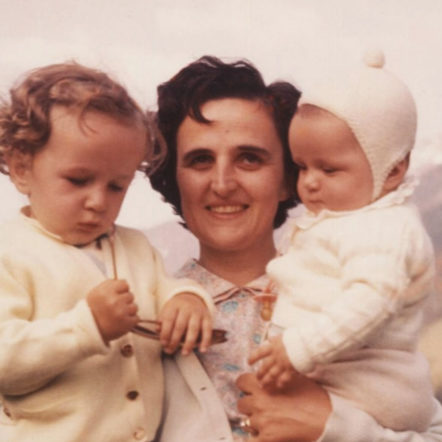“Get up. I myself am also a human being.”
There was no way Simon Peter (Acts 10:25-26, 34-35, 44-48) would have allowed Cornelius to worship him as a deity. Peter was too aware of his human frailty, of his embarrassing fears, of his triple denial of Jesus to pass himself off for a god.
In my obscure and much more modest world, I felt the same way, especially in Thailand, whenever people fell at my feet, paid me homage out of deference or respect or to get a favor from me. I felt very, very uneasy and thoroughly sinful.
Our second reading (1 John 4:7-10) and Gospel passage (John 15: 9-17) make me feel not only sinful, but force me also to wonder if I am loving anyone as every child of God should.
Beloved, let us love one another, because love is of God; everyone who loves is begotten by God and knows God. (1 John 4:7)
There is no question that I am begotten by God. In Baptism, I became one of His children by adoption; and through Jesus, the Only Begotten Son of God, I have been living in the eternal embrace of the Triune God who is love.
The burning question that scares me is this: “Whom do I truly love?”
It cannot be a question of whom I am supposed to love as myself. It is not even a question of whom do I give people the impression of loving as myself, but whom I do love in deeds and truth. (1 John 3:18) For whom am I willing to do the things I do for myself, like the attention, the care, the concern, even the occasional pampering that I devote to myself?
Those who are parents might give a more acceptable answer than I can. Most likely they could say that they love their spouse and children as much as they love themselves; even more than themselves. Do you see how scary these life-and-death questions can be? The starting point in assessing our response must be the fact that God loved us and sent His Son as expiation for our sins.
The puny size and spotty intensity of our loving could be explained by our failure to appreciate the infinity of the Father’s love as made visible in the death of His Son on the cross. We might love someone less, even much less than we love ourselves and still go on with our life unfazed, unperturbed, not realizing the inappropriateness of our response to God’s infinite love. This set of readings, though, forces us to pause and do some serious thinking.
Whoever is without love does not know God, for God is love. (1 John 4:8)
This is one of the most powerful knockout punches in the whole Bible. God uses John to let us know that His very essence is LOVE; and He also points out the absurdity of our being in Him, the Holy Trinity, without being constantly driven and consumed by love. How is it possible not to know, intellectually, but even more so emotionally and viscerally, that we are totally immersed in, and smothered by God’s love?
Today is Mother’s Day. As believers, we cannot take this as a coincidence. Regardless of being living or deceased, most likely, our mother remains for us the best icon of genuine loving the way intended by our Triune God. We do not have to tell Jesus that we are as weak as Simon Peter was and as sinful as he felt before Cornelius. Jesus knows all that because, through Baptism and Holy Communion we are one with him. Thus, in reacting to this set of readings, we become painfully aware of our sinfulness and of our habitual failure to love as we should.
Therefore, Jesus lifts us up by calling us his friends. This is his decision, not ours. It is not ours, because we might not be ready for the challenges that true friendship requires. Servants do not have to act out of love. They do what they are supposed to do and, then, they are done. They can expect a reward or, at least, to be left alone once they have carried out their master’s orders.
By calling us “friends,” Jesus changes our condition and our relationship from what they are now (mostly as servants) to what they are supposed to be for us, his brothers and sisters, adopted children of the Heavenly Father.
As his friends, we can expect that he will help us know the Father as much as it is humanly possible. As his friends, we do not have to cover up our deficiencies and flaws because we are certain that his love for us makes up for all of them. As his friends, we can expect him to share with us his joys and sorrows, and to share in ours as well. But he tells us that the joy which he wants to share with us is meant to be complete. (Cf. John 15:11)
Speaking of joy, we cannot be foolish or naïve enough to think that we could find complete joy anywhere else; with anyone else. However, as his friends, we must brace ourselves for responding to his love as true friends do—and much, much more. In spite of knowing full well about our frailty and human limits, Jesus doesn’t keep the bar at loving others as we love ourselves, but sets it impossibly high: “love one another as I love you.” In doing so, does he set us up for guaranteed failure? No. The reason behind this unrealistic command is twofold.
Firstly, the needs for genuine loving are so dire that we have to love one another without the possibility of setting a limit. Remember? We are not his servants on a fixed work schedule and with specific chores. We are his friends.
Secondly, we have to love with an abiding sense of inadequacy so that we take no credit for our loving and we keep asking the Holy Spirit to sustain us also in this effort until we experience the completeness of the joy that Jesus wants to share with us.
And here is a wonderful way of extolling our Moms on Mother’s Day: it is by holding them up as our role models for a most genuine Christian loving so that we may, soon, rightly claim of knowing God who is love.








